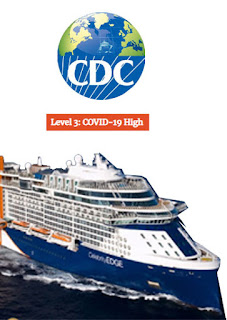As we approach the resumption of sailing from U.S. ports of call, the CDC has lowered the threat level for vaccinated guests and provided recommendations for all travelers.
Key Information for Cruise Ship Travelers Who Are Not Fully Vaccinated
- CDC recommends that people who are not fully vaccinated avoid travel on cruise ships, including river cruises, worldwide. Since the virus spreads more easily between people in close quarters aboard ships, the chance of getting COVID-19 on cruise ships is high. It is especially important that people who are not fully vaccinated with an increased risk of severe illness avoid travel on cruise ships, including river cruises.
- Cruise passengers who are not fully vaccinated are more likely to get COVID-19, which spreads person-to-person, and outbreaks of COVID-19 have been reported on cruise ships.
- People who decide to go on a cruise should get tested 1–3 days before their trip and 3–5 days after their trip.
- In addition to testing, passengers who are not fully vaccinated should self-quarantine for 7 days after cruise travel, even if they test negative. If they do not get tested, they should self-quarantine for 10 days after cruise travel.
- See recommendations for cruise ship travelers.
There still is no outcome on the battle between Florida and the CDC regarding requirements for vaccinations. That suit is still pending. Also, there is no clear answer on how cruise lines will be able to enforce the current vaccination requirement with the ban in Florida for businesses to require vaccines. Celebrity Edge sails June 26th, so we should know soon.
Stay Updated on Recent
Cruise Industry
& Other Travel News
Click Image for Related Posts
I recently completed extensive training and have become Travel Safety Verified. As your dedicated Travel Advisor, your safety is our priority, and it's our job to ensure you have the necessary information you need to give you confidence and peace of mind when making your future travel plans. Click the link to review our Travel Safety program with valuable resources that will answer many of your questions.








